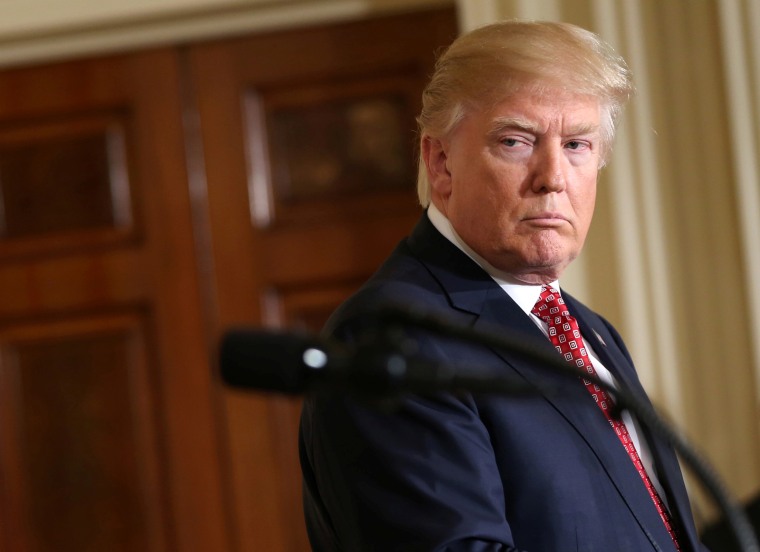"I like to think of myself as a very flexible person. I don't have to have one specific way, and if the world changes, I go the same way. I don't change. Well, I do change. And I am flexible. And I'm proud of that flexibility. And I will tell you that attack on children yesterday had a big impact on me, big impact. That was a horrible, horrible thing."And I've been watching it and seeing it, and it doesn't get any worse than that. And I have that flexibility. And it's very, very possible, and I will tell you it's already happened that my attitude toward Syria and Assad has changed very much. And if you look back over the last few weeks, there were other attacks using gas. You're now talking about a whole different level."So, as you know, I would love to have never been in the Middle East. I would love to have never seen that whole big situation start. But once it started, we got out the wrong way and ISIS formed in the vacuum and lots of bad things happened. I will tell you what happened yesterday is unacceptable to me."
Trump tries to come to terms with the presidential learning curve
The president is "discovering for himself things the rest of us already knew." It's a lengthy, clumsy process for everyone involved.

Donald Trump hosted a fairly brief White House press conference today, alongside Jordan's King Abdullah, and much of the Q&A focused on developments in Syria. Given this week's developments, that made sense -- which is more than can be said for the president's comments.Trump continued to blame President Obama for this week's attack, complaining that his predecessor failed to take advantage of a "great opportunity" to launch a military offensive in Syria in 2013. Of course, in 2013, Trump repeatedly called on Obama not to launch a military offensive in Syria, making it that much more ridiculous for the Republican to whine now about the position he said he agreed with.Asked today if the Assad regime's apparent chemical attack this week crossed a red line for him, Trump added, "It crossed a lot of lines for me.... That crosses many, many lines. Beyond a red line, many, many lines."In practical terms, no one really knows what that means. His position appears to have something to do with "many" and "lines."But perhaps the most striking moment of the press conference came when a reporter asked Trump to explain his administration's plans for U.S. policy towards Syria. The president said:
Some of this is just incoherent. I don't know what it means when the president says, "If the world changes, I go the same way. I don't change. Well, I do change." I'm also not altogether sure Trump understands the difference between ISIS and the Assad government in Syria.But the crux of his response was that he's beginning to change his mind about Assad because he was mortified by this week's chemical attack.Six weeks after Trump declared, "Nobody knew that health care could be so complicated," I half-expected him to say today, "Nobody knew that Assad could be so monstrous."The president wants everyone to now know that his "attitude toward Syria and Assad has changed very much." OK, but what was his attitude before based on? Why did it take this week's violence and bloodshed to change Trump's mind about something he should've known before?If it seems like this keeps happening with Trump, it's not your imagination. Trump thought overhauling the nation's health care system would be easy, right up until he discovered that it's "complicated." He "didn't realize" the nuances of how Congress works. He thought private-sector deal-making was effectively the same as reaching governmental agreements, and was surprised to discover otherwise.He apparently didn't realize that Assad is responsible for a series of deadly atrocities, which is why we're only now seeing the president's attitude toward Assad "change very much."The Washington Post's Dana Milbank recently wrote, "Trump's discoveries of seemingly obvious things raise two possibilities: 1) He thinks people are awfully stupid, or 2) he is discovering for himself things the rest of us already knew. Which is true? Nobody knows."Perhaps not, but we can probably take an educated guess.Postscript: At another point today, a reporter asked Trump about Iranian support for the Syrian regime. The president replied, "The Iran deal made by the previous administration is one of the worst deals I have ever witnessed and I've witnessed some beauties. It's one of the worst deals I've ever witnessed. It should never have been made. It was totally one-sided against the United States, and frankly, against much of the Middle East."Putting aside how ridiculously untrue that is on a substantive level, it appeared Trump didn't understand the question. He heard the word "Iran," and reflexively repeated a nonsensical talking point related to Iran that allowed him to slam Obama.